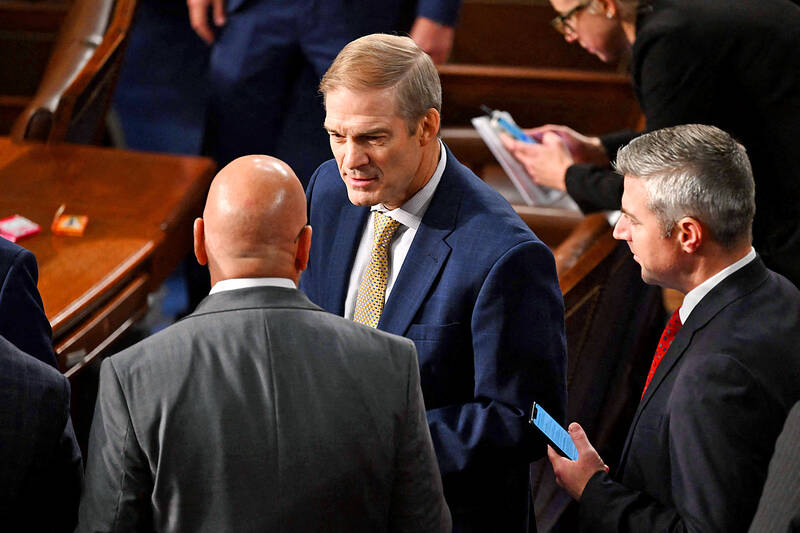Having lost the first vote to become US House of Representatives speaker, US Representative Jim Jordan is to try again on a decisive second ballot that would test whether the ally of former US president Donald Trump can win over the holdouts or if his bid for the gavel is collapsing.
Ahead of yesterday morning’s voting, Jordan made an unexpected plea for party unity, with the House Judiciary Committee chairman telling his colleagues on social media: “We must stop attacking each other and come together.”
A surprisingly large and politically diverse group of 20 Republicans had rejected Jordan’s nomination, many resisting the hardball tactics enforcing support, and viewing the Ohio congressman as too extreme for the powerful position of House speaker, second in line to the presidency.

Photo: AFP
Additional voting on Tuesday was postponed as the House hit a standstill, stuck while Jordan worked to shore up backing from Republican colleagues for the job to replace ousted former House speaker Kevin McCarthy.
“We’re going to keep working,” Jordan said late on Tuesday at the Capitol.
It has been two weeks of angry Republican infighting since McCarthy’s sudden removal by hard-liners, who are now within reach of a central seat of US power. The vote for House speaker, once a formality in the US Congress, has devolved into another bitter showdown for the gavel.
The tally, with 200 Republicans voting for Jordan and 212 for Democratic House Minority Leader Hakeem Jeffries, left no candidate with a clear majority, as the 20 Republicans voted for someone else. With Republicans in majority control 221-212, Jordan must pick up most of his Republican foes to win.
Jeffries swiftly intervened, declaring it was time for Republicans to partner with Democrats to reopen the House — in what would be an extraordinary if not unprecedented moment in congressional history.
Bipartisan groups of lawmakers have been floating ways to operate the House by giving greater power to interim House Speaker Patrick McHenry or another temporary speaker. The House had never ousted its speaker before McCarthy, and the lawmakers are in rarely tested terrain.
“The Republicans are unable to function right now,” Jeffries said . He said talks would “accelerate” between Democrats and Republicans on alternative plans.
Flexing their independence, the holdouts range from seasoned legislators and committee chairs worried about governing, to newer lawmakers from districts where voters prefer US President Joe Biden to Trump.
Some Republicans resent being pressured by Jordan’s allies and say they are being threatened with primary opponents if they did not support him as speaker.
As Tuesday’s somber roll call was under way, each lawmaker announcing their choice, the holdouts quickly surfaced.
One, US Representative Mario Diaz-Balart, a veteran appropriator, said later that he would not be “pressured or intimidated” over his vote.
“That millisecond when anybody tries to intimidate me is the moment where I no longer have the flexibility,” Diaz-Balart said.
Another holdout, US Representative Ken Buck said that Jordan’s role in the run-up to the Jan. 6, 2021, attack on the Capitol and his refusal to admit that Biden won the 2020 election remained an issue.

Kehinde Sanni spends his days smoothing out dents and repainting scratched bumpers in a modest autobody shop in Lagos. He has never left Nigeria, yet he speaks glowingly of Burkina Faso military leader Ibrahim Traore. “Nigeria needs someone like Ibrahim Traore of Burkina Faso. He is doing well for his country,” Sanni said. His admiration is shaped by a steady stream of viral videos, memes and social media posts — many misleading or outright false — portraying Traore as a fearless reformer who defied Western powers and reclaimed his country’s dignity. The Burkinabe strongman swept into power following a coup in September 2022

‘FRAGMENTING’: British politics have for a long time been dominated by the Labor Party and the Tories, but polls suggest that Reform now poses a significant challenge Hard-right upstarts Reform UK snatched a parliamentary seat from British Prime Minister Keir Starmer’s Labor Party yesterday in local elections that dealt a blow to the UK’s two establishment parties. Reform, led by anti-immigrant firebrand Nigel Farage, won the by-election in Runcorn and Helsby in northwest England by just six votes, as it picked up gains in other localities, including one mayoralty. The group’s strong showing continues momentum it built up at last year’s general election and appears to confirm a trend that the UK is entering an era of multi-party politics. “For the movement, for the party it’s a very, very big

ENTERTAINMENT: Rio officials have a history of organizing massive concerts on Copacabana Beach, with Madonna’s show drawing about 1.6 million fans last year Lady Gaga on Saturday night gave a free concert in front of 2 million fans who poured onto Copacabana Beach in Rio de Janeiro for the biggest show of her career. “Tonight, we’re making history... Thank you for making history with me,” Lady Gaga told a screaming crowd. The Mother Monster, as she is known, started the show at about 10:10pm local time with her 2011 song Bloody Mary. Cries of joy rose from the tightly packed fans who sang and danced shoulder-to-shoulder on the vast stretch of sand. Concert organizers said 2.1 million people attended the show. Lady Gaga

SUPPORT: The Australian prime minister promised to back Kyiv against Russia’s invasion, saying: ‘That’s my government’s position. It was yesterday. It still is’ Left-leaning Australian Prime Minister Anthony Albanese yesterday basked in his landslide election win, promising a “disciplined, orderly” government to confront cost-of-living pain and tariff turmoil. People clapped as the 62-year-old and his fiancee, Jodie Haydon, who visited his old inner Sydney haunt, Cafe Italia, surrounded by a crowd of jostling photographers and journalists. Albanese’s Labor Party is on course to win at least 83 seats in the 150-member parliament, partial results showed. Opposition leader Peter Dutton’s conservative Liberal-National coalition had just 38 seats, and other parties 12. Another 17 seats were still in doubt. “We will be a disciplined, orderly